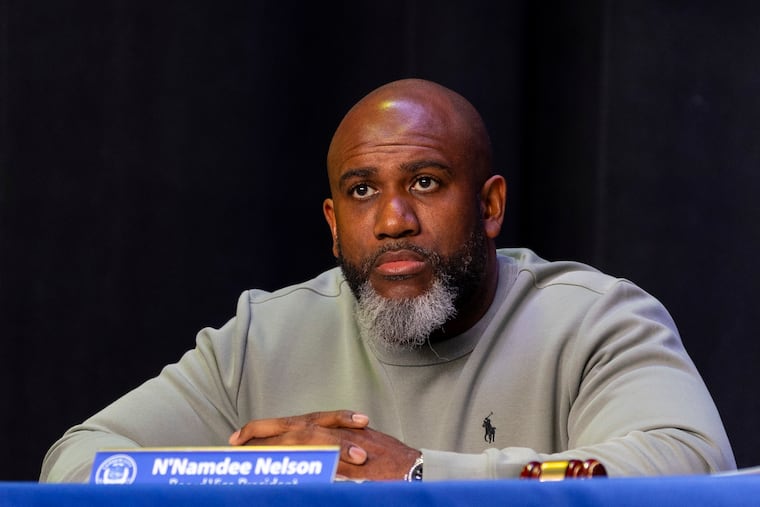New president to succeed Wasim Muhammad, another board member resigns, and other takeaways from the Camden school advisory board meeting
The Camden school advisory board now has two vacancies after board member Nyemah Gillespie stepped down.

The Camden school advisory board elected a new president to replace former leader Wasim Muhammad, who resigned two weeks ago amid the fallout from a civil sex abuse lawsuit involving a former student that cost the district millions.
Without debate, the board voted 7-0 Tuesday to tap N’Namdee Nelson as president. He had served as vice president of the nine-member board. Nelson also served as acting president when Muhammad took a leave of absence in January while the lawsuit was pending.
» READ MORE: The embattled Camden school advisory board president has resigned after months of protests
Also announced at the meeting was the departure of board member Nyemiah Gillespie. In her resignation letter, Gillespie said her resignation came from “a place of deep disappointment,” including the “actions of the former board president.”
“My love for Camden runs deep, and my passion for advocating for children and their education has always been at the forefront of my commitment,” Gillespie wrote. “I believe it is essential for my well-being and that of my family to take some time to focus on my mental health.”
Gillespie was on vacation and declined to comment further Wednesday. In a Facebook post, she said she was looking “forward to the next chapter that God has planned for me.” Her term was scheduled to expire in January 2026.
The board elected Jeanette Alvarez as vice president in a 7-0 vote.
The board has 65 days to fill the vacancies through appointments, said spokesperson Sheena Yera. Applications will be posted soon on the district’s website.
Nelson sought to change the discourse that has plagued recent board meetings. Before Muhammad’s resignation, protesters disrupted the two meetings that Muhammad attended so that no business could be conducted.
“We may not always agree on everything, but when we are able to communicate with one another respectfully, a lot more gets done,” Nelson said. “You have a committed board up here that is willing to work.”
A board in disarray
The board has been in disarray since a lawsuit was filed against Muhammad by a former student alleging he sexually assaulted her when he was her teacher in 1994.
In the 2021 civil lawsuit, the student, Salema Hicks Robinson, accused Muhammad of sexually abusing her when he was her social studies teacher at Cooper B. Hatch Middle School. She said the abuse began when she was 14.
A six-member jury in May found that Muhammad, formerly known as Donnie Walker, had not sexually abused Robinson, but “recklessly or intentionally committed extreme and outrageous conduct” upon her.
Robinson, 45, was awarded $1.6 million, which was increased to $2 million under a settlement. The case cost the school system more than $800,000 in legal fees.
Muhammad has denied any wrongdoing and said he resigned because his tenure had become a distraction.
Because the Camden school system is under a state takeover, the board serves in an advisory capacity and has no real authority. Decisions are made by state Superintendent Katrina T. McCombs.
Here are some other takeaways from the meeting.
Struggles in graduation proficiency
McCombs announced New Jersey Graduation Proficiency Assessment results that show Camden students continue to struggle in language arts and math.
Only 34% of 11th graders passed the language arts portion, compared with 82% statewide, she said. For math, 8.3% of Camden students met the standard, compared with 55% statewide, she said.
The test was administered last spring to juniors statewide and is required to graduate with the class of 2025. Students will get another chance to take the test, and students who fail the exam can still graduate through an alternative assessment or a portfolio appeals process.
McCombs said the district offered a graduation exam boot camp in July for rising seniors.
New Jersey is one of only 11 states that continue to require exit exams to graduate from high school. A state law on the books since 1979 mandates a high school exit exam.
» READ MORE: Should New Jersey drop its high school graduation exam for good?
Harassment and bullying incidents
McCombs also released the latest tallies of incidents of harassment, intimidation, and bullying (HIB) in Camden schools. Districts are required by the state to provide those findings to the public twice a year.
Between January and June, 49 HIB incidents were investigated, McCombs said. Nine incidents, all occurring at K-8 schools, were substantiated, she said. There were no incidents reported at the district’s high schools.
McCombs said disciplinary action taken included counseling, detention, and parent conferences. The district also has programs to promote social-emotional learning, peer relationships, and a safe climate and culture.
Although New Jersey has some of the toughest anti-bullying laws in the country, a state report in March found that bullying is on the rise in the state’s public schools, with an alarming number of students turning to social media to spread rumors or threaten classmates.
Cyberbullying increased from 15% of all bullying incidents in 2018-19 to 37% in 2021-22, according to the report by the New Jersey Anti-Bullying Task Force. It was second to verbal bullying, which accounted for 44% of incidents. Cyberbullying can take place on digital devices through emails, text messages, and social media.
» READ MORE: Bullying in N.J. schools has jumped to its highest level ever, state report finds